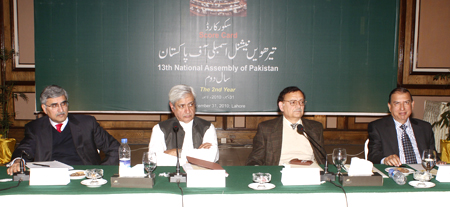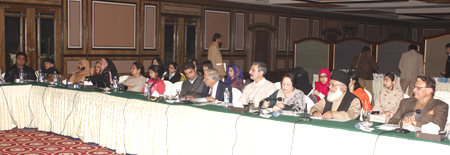|
|
| |
| EVENTS |
|
|
> Despite shortcomings, Democratic System Must Continue
|
|
|
| |
Lahore, December 31; In discussing the performance of the National Assembly and its evaluation in the context of democratic strengthening, the speakers at a PILDAT Consultative Session agreed that despite its shortcomings, the democratic system must continue. |
|
| |
Syed Fakhar Imam, former Speaker of the National Assembly of Pakistan chaired the session and together with Prof. Muhammad Waseem, Professor at the Department of Humanities and Social Sciences, Lahore University of Management Sciences (LUMS) made keynote speeches on the occasion while the session participants included a mix of MPs, analysts and the media.
|
|
| |
Marginal change has been seen in the performance of the 13th National Assembly of Pakistan from the first to the second year, said Mr. Ahmed Bilal Mehboob, PILDAT Executive Director, while presenting an overview of the performance of the 2 years of the National Assembly of Pakistan. He said that the National Assembly received an overall evaluation score of 50 compared to 49 in the first year using the IPU international criteria of evaluation. He said this underscores that the need for reforms and improvements is as pressing as the previous year. |
|
| |
Prof. Dr. Muhammad Waseem said that PILDAT�s periodic analysis of the performance of the legislature is vital for legislators. He said that the most important function of the Parliament is to address public concerns. He suggested that there should be more in depth surveys for compilation of such score cards in the future. |
|
| |
Syed Fakhar Imam said that the most important function of the parliament is its accountability to the masses. Legislation is the strongest pillar of the Parliament. He was of the opinion that the general public was not aware of the proceedings of the Parliament and a general disconnect between the Parliament and the masses is evident. He suggested that ways and means in this modern age of media be devised to telecast the parliamentary debates so that public can be involved in the policy making procedure. The political culture needs to be changed and reformed if we desire for it to be comparable to the developed Parliaments of the world. He said that the unanimous passage of the 18th Constitutional Amendment is a great achievement of the Parliament though it should have been debated extensively. He suggested that a Question Hour should be mandated for the Prime Minister after every two weeks. Referring to the money bills and the budgetary processes in developed democracies, he said that where the Parliaments are strong not a single penny can be spent without its approval. Holding the government to account is the main job of the Parliament. |
|
| |
|
|
| |
|
|
| |
|
|
| |
|
|
| |
|
|
| |

|
|
| |
|
|
| |

|
|
|
|
|
|
|
|
|